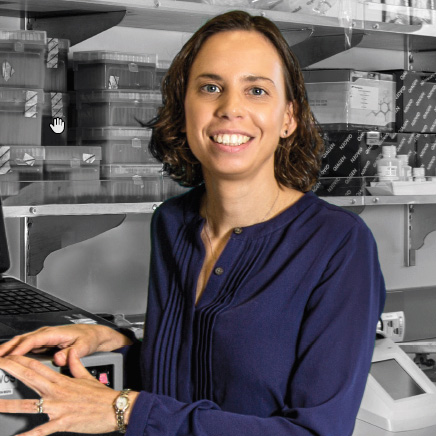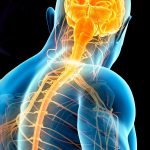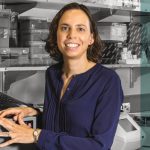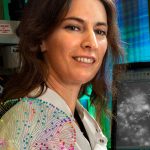OBSERVATIONS An interview with Diana Hargreaves
At a recent Salk event, Diana Hargreaves was talking with some attendees whose grandchildren were looking at colleges. They commented that Hargreaves must have attended a large research university as an undergraduate in order to become a scientist at such an elite institution as Salk. She told them that, actually, she had attended a liberal arts college of only 1,000 students called Haverford. “Really?” they exclaimed. “You’re a top scientist and you went to a place like Haverford?” She replied, “It’s because I went to Haverford!”
Hargreaves doesn’t often talk about her undergraduate institution, but it turns out to fit a pattern for the assistant professor in Salk’s Molecular and Cell Biology Laboratory: choosing small, intimate environments where, as she puts it, “there’s less hierarchy in terms of thoughts and ideas.” Her graduate program at Yale University was like that, and it’s what she values about Salk.
Inside Salk talked with Hargreaves about why she prefers smaller intellectual environments, what excites her about the science she does at the Institute, and how she thinks about being a woman in science.
What is special about smaller institutions?
Visibility. There’s more possibility of having a voice because there aren’t 400 people out-voicing you. You’re able to contribute. My undergraduate experience was incredibly formative. You’re in a classroom with 15 other kids and you’re talking directly to the scientist—you’re talking to [someone like] Ron Evans! He’s spending time with you! Getting your education from someone who has some history with the material is incredibly valuable. It sets the foundation for how to study and learn and be resourceful. All of that foundation is much more important than learning how to pipette—that’s vocational. But learning how to think, how to write papers, how to be creative about the questions you’re interested in and to develop your own ideas—that’s the hard part, but it’s incredibly valuable.
Salk is that way, too. The senior faculty are all very approachable. I’ve had great discussions with Ron Evans and Inder Verma about their fields, and the history at Salk. I talk to Tony Hunter almost every day! Normally junior faculty wouldn’t get that kind of access to senior faculty. The environment at Salk really allows assistant professors to thrive.

Were you always interested in science?
I think I was naturally inclined to do science from pretty early on. I had lots of great teachers along the way, but my mom is probably one of the most important role models. She was in one of the country’s first MD/PhD programs—she’s a pathologist and an academic—and I think that having that visual of her doing it, of making it work—and making it work with a family—as well as giving me lots of encouragement of the “follow your passions” type was really important. It’s funny—she started in chemistry, I ended up doing chemistry. She did her PhD on chemotherapy in rats and now I’m in cancer biology.
Is that how you ended up in cancer biology?
I got my undergrad degree in chemistry, but I’ve always been interested in the basic mechanisms of transcriptional regulation—asking what the cellular machinery is that tells cells which genes to use, when they should be on and when they should be off. As a graduate student, I began to focus on complexes involved in chromatin remodeling.
[DNA is tightly packaged in bundles called chromatin and, in order for it to be read, it has to be unwound by large protein complexes known as chromatin remodelers or regulators.]
Next-generation sequencing was coming onto the scene, and a couple of years into my postdoc we had this wealth of information just fall into our laps. One of those proteins turned out to be highly mutated in cancer, and it was one of these things you couldn’t ignore because the mutation frequency was so large. The Arid1a gene, which I study, turns out to be one of the most frequently mutated genes of these complexes, so we’ve been trying to understand how mutations in that gene affect the process when gene expression is turned on.
Every cell contains the same DNA blueprint, the same instructions. But only parts of the blueprint are used by each cell to confer identity. You can think of the protein complex that I work on as a team of workers reading that blueprint.
So the idea is that when you have mutations in these chromatin regulators, you kind of change the cell identity because you basically pull out the wrong set of instructions. So what was a normal cell takes on different qualities. And in some cases those can be qualities that cancer cells thrive on.
You followed your mom into cancer research—do you talk to her about being a woman in science?
Not really. She never made a big issue of it, which is probably why it never seemed like a huge hurdle for me. She had more of an attitude of, “Why not?” If you find something interesting, get into it. Don’t worry about anything that might create obstacles.
So what makes the Salk Women & Science program important to you?
I don’t necessarily shy away from discussions of being a woman in science, but sometimes those discussions can psych people out a bit. I think one of the most important things for women scientists is just being present and visible and showing that you’re happy and doing the work that you want to be doing. So I would say that if you find something interesting, try it and see how it goes. Don’t dwell on the expectation that it’s going to be negative. Things aren’t changing overnight, but people are definitely trying. That’s why I think the Women & Science program is great, because it’s important to be visible in a way that’s positive.
You’re married with two young children. How do you find work-life balance?
My older boy is four and the younger one is not quite six months. I think everybody’s doing well. I have to compartmentalize to get my work done, because I don’t have the unlimited hours that I had when I didn’t have a family. And so the things that are an immediate priority always rise to the top. On the days I have teaching or administrative duties, I feel like the science can take a hit. It’s like, OK, I’m going to have to pick up on that Western blot tomorrow because it’s not calling me on the phone!
How do you relax?
I really love hiking and my husband and I have done quite a bit of that. I’m trying to get my boys interested but they’re still a bit young. My parents dragged my brother and me hiking all over the place. I did some exciting backpacking trips in my youth, and I’d like my boys to do that as well. San Diego offers a lot of opportunities for it, so you don’t have to be a very creative parent!
We’ll probably do a couple of camping weekends this summer, and I’m looking forward to that.
Support a legacy where cures begin.
Featured Stories
 Untangling the mysteries of the spinal cordConverging research and innovative technologies are tackling some of the deadliest motor diseases.
Untangling the mysteries of the spinal cordConverging research and innovative technologies are tackling some of the deadliest motor diseases. An interview with Diana HargreavesInside Salk talked with Hargreaves about why she prefers smaller intellectual environments, what excites her about the science she does at the Institute, and how she thinks about being a woman in science.
An interview with Diana HargreavesInside Salk talked with Hargreaves about why she prefers smaller intellectual environments, what excites her about the science she does at the Institute, and how she thinks about being a woman in science. Delving into the best of both worlds with Shani SternAs the only electrophysiologist in the lab, Stern uses her engineering expertise to delve into the biological mysteries that most intrigue her, particularly bipolar disorder.
Delving into the best of both worlds with Shani SternAs the only electrophysiologist in the lab, Stern uses her engineering expertise to delve into the biological mysteries that most intrigue her, particularly bipolar disorder.





















































